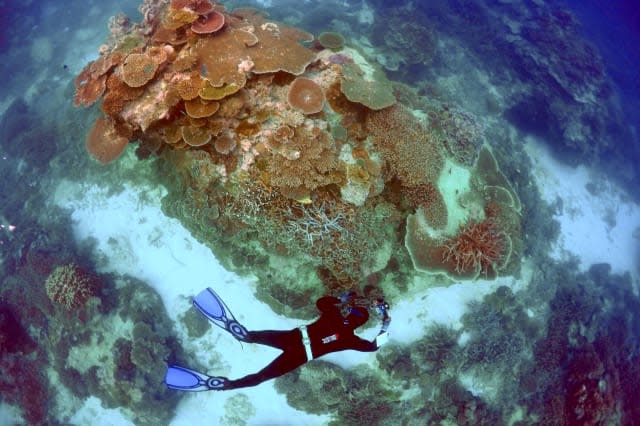Great Barrier Reef declared 'dead' in obituary

The Great Barrier Reef has been declared 'dead' in an online obituary.
The obituary was written for Outside Magazine by Rowan Jacobsen. It talks about the devastating effects of coral bleaching and declares: "The Great Barrier Reef of Australia passed away in 2016 after a long illness."
It also reads: "Climate change and ocean acidification have killed off one of the most spectacular features on the planet."
It notes age of the Great Barrier Reef, located in northern Australia, as being 25 million years.
See also: Coral bleaching is ruining the Great Barrier Reef
See also: Why was Great Barrier Reef removed from climate change list?
According to Ocean Service, coral bleaching occurs when corals are stressed by changes in conditions such as temperature, light, or nutrients. They expel the symbiotic algae living in their tissues, causing them to turn completely white.
It adds: "Warmer water temperatures can result in coral bleaching. When water is too warm, corals will expel the algae (zooxanthellae) living in their tissues causing the coral to turn completely white.
"This is called coral bleaching. When a coral bleaches, it is not dead. Corals can survive a bleaching event, but they are under more stress and are subject to mortality."
If the algae loss is prolonged and the stress continues, coral eventually dies.
The obituary reads: "By the turn of the millennium, mass bleachings were common. The winter of 1997–98 brought the next big one, followed by an even more severe one in 2001–02, and another whopper in 2005–06. By then, it was apparent that warming water was not the only threat brought by climate change. As the oceans absorbed more carbon from the atmosphere, they became more acidic, and that acid was beginning to dissolve the living reef itself."
Climate change is being blamed for a huge coral bleaching event this year that saw a rapid decline of the Great Barrier Reef. The Guardian reports that the event touched "93% of reefs on the Great Barrier Reef this year".
It adds that the "worst impacts were in the remote northern third of the reef, far from where tourists regularly go. While almost a quarter of coral has been killed on the Great Barrier Reef, it has been concentrated in the area north of Port Douglas".
According to Morning News USA, the effect, studied by aerial and underwater surveys over the last four months, "can be seen in the 35 percent of coral in central and northern parts that have died as a result of bleaching".
Explaining more about the reef, the obituary reads: "For most of its life, the reef was the world's largest living structure, and the only one visible from space. It was 1,400 miles long, with 2,900 individual reefs and 1,050 islands. In total area, it was larger than the United Kingdom, and it contained more biodiversity than all of Europe combined.
"It harboured 1,625 species of fish, 3,000 species of mollusk, 450 species of coral, 220 species of birds, and 30 species of whales and dolphins."
Charlie Veron, chief scientist for the Australian Institute of Marine Science and the Great Barrier Reef's "most passionate champion", says of this year's bleaching: "The whole northern section is trashed. It looks like a war zone. It's heartbreaking."
He adds: "I used to have the best job in the world. Now it's turned sour... I'm 71 years old now, and I think I may outlive the reef."
Related video:




